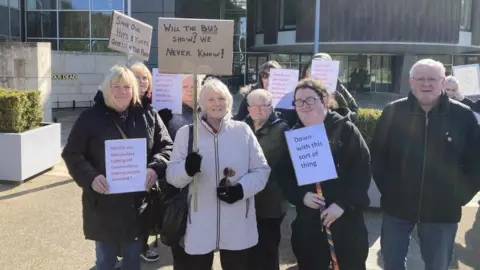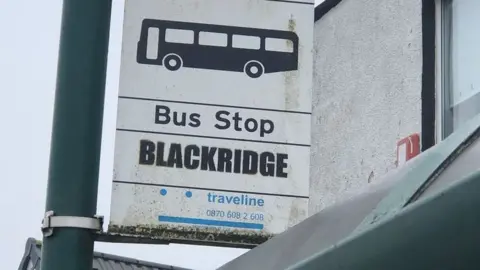First minister agrees to crisis meeting on axed local McGill's bus routes
 McGill's
McGill'sThe first minister has agreed to a crisis meeting with West Lothian Council over cancelled local bus services.
It comes after the area's major supplier, McGill's Eastern Scottish, announced it was quitting all its routes by December.
Towns and villages could now be left with little or no bus service.
McGill's said that, despite investing around £4.5m, current losses were simply unsustainable.
Humza Yousaf has now said a meeting will be held between the transport minister, local MSP Fiona Hyslop, and Transport Scotland to try and resolve the issue.
West Lothian Council leader Lawrence Fitzpatrick told the BBC's Good Morning Scotland radio programme that he was glad the first minister had agreed to facilitate the meeting.
"We need a bus service in our county without any doubt because thousands of people rely on buses to get to work and get to hospital," he said.
"These people are in a very untenable and frightening situation.
"The only solution is funding from the Scottish government to support local bus services and that is a message that has come across loud and clear from the bus operators themselves."

'Getting a bus to work is a must for me'
 Reach plc
Reach plcEarlier this year, the group Save Our Buses (West Lothian) protested after the Scottish government ended emergency Covid funding, which led to a reduction in services.
The worst-hit areas were the smallest and most poorly-served communities on the western fringe of West Lothian, including Greenrigg and Blackridge.
Partial restoration of those services only came about after the council agreed to subsidise buses to the villages. However, the new services ran less frequently than before.
Dee Pringle was one of the founders of the Save Our Buses group and told BBC Scotland News that the local community was not happy about the news from McGill's.
"Everyone is angry about this announcement, this affects everyone. I am a sales assistant, so getting a bus to Livingston centre is a must for me," the 25-year-old said.
'My anxiety is through the roof'
 Dianne Hamilton
Dianne HamiltonDiane Hamilton, 39, lives in Whitburn and works in the endoscopy department at St John's hospital in Livingston.
"My anxiety about the buses being cancelled is through the roof," she said.
"I don't drive and nor can I afford to learn. I rely on the number 23 bus to get to work and home again.
"Without the bus, I will not be able to get to work, and so I'm torn. How will I be able to keep my job and pay my bills and mortgage? I am extremely worried about it."
On the social media site X, formerly known as Twitter, Transport Secretary Fiona Hyslop said: "The announcement from McGill's to cease services in West Lothian is extremely concerning and not in line with the improvement plans they laid out to me following their takeover of services from First Bus.
"I've requested an urgent meeting as the local MSP to pursue this issue."
McGill's made the announcement on Tuesday that they were pulling their services from West Lothian starting next month with the X22 and X24 Livingston-Edinburgh services being axed from 15 October.

 Reach plc
Reach plcMcGill's chief executive Ralph Roberts said keeping the routes going was commercially unsustainable.
"We've owned the business just over a year now and it was an ailing business when we took it over," he said.
"The owners of McGill's have pumped in over £80,000 per week to keep this business going. We haven't just cut and run, we gave it our best shot."
He said financial struggles were down to a number of issues including competition in the area from rival service Lothian Buses, rail service coverage and the changes brought about by the Covid-19 pandemic.
Government funding is the only viable solution to keeping the service alive, he said.
"The commercial bus market will work with national and local governments in order to make this happen," Mr Roberts said.
"We subside routes all over Scotland but ultimately at this level of burn it's starting to affect bus services elsewhere, so something needs to be done."
A Transport Scotland spokesperson said the majority of bus services in Scotland were operated on a commercial basis by private bus companies and the power to subsidise services lay with the local authority.
"We are committed, alongside operators and local authorities, to improving services to ensure everyone has accessible public transport, regardless of geographic location," they said.
Additional reporting by the Local Democracy Reporting Service.
